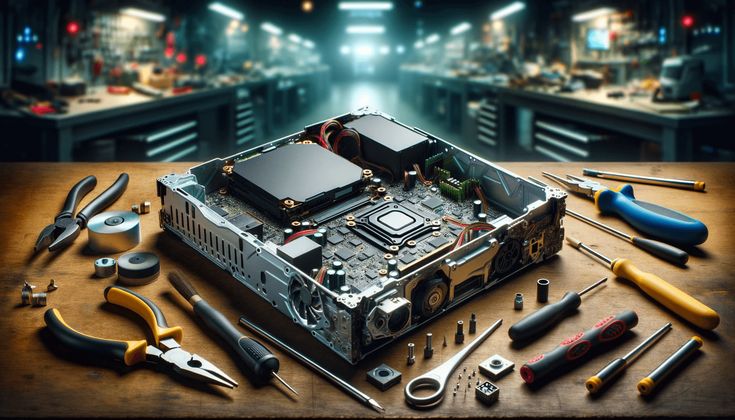Welcome to the world of consoles! In this comprehensive guide, we’ll unravel the mysteries of this essential tool in computing. Whether you’re a seasoned tech enthusiast or a curious beginner, by the end of this journey, you’ll have a deep understanding of what a console is, how it works, and its significance in the digital realm.
What is a Console?
A console, alternatively known as a computer console, root console, system console, or terminal, serves as a fundamental interface between users and computers. Picture it as a window into the inner workings of a machine, allowing users to interact with the system directly. Unlike the graphical user interface (GUI), which provides a visual representation of operations, a console primarily relies on text-based commands for communication.
The Evolution of Consoles
The concept of consoles traces back to the early days of computing when systems were primarily operated through command-line interfaces (CLI). As technology advanced, consoles evolved from basic terminals to sophisticated interfaces capable of executing complex tasks. Today, consoles come in various forms, including physical terminals, virtual consoles, and remote terminals accessed over networks.
Components of a Console
Understanding the components of a console is essential for harnessing its full potential. At its core, a console comprises three main elements: input, output, and processing. The input component allows users to enter commands and data, while the output component displays the results of those commands. The processing component interprets the commands and executes them within the system.
Types of Consoles
Consoles come in different flavors, each tailored to specific purposes and environments. Some common types include:
- Local Console: A physical terminal directly connected to a computer or server.
- Virtual Console: An emulated terminal interface accessed through software.
- Remote Console: A console accessed over a network connection, allowing users to manage remote systems.
Practical Applications of Consoles
Consoles play a vital role in various fields, from system administration to software development. Here are some practical applications where consoles shine:
- System Administration: Consoles provide administrators with powerful tools for managing and troubleshooting computer systems.
- Programming: Many developers prefer using consoles for writing and testing code due to their efficiency and flexibility.
- Network Management: Consoles enable network administrators to monitor and configure network devices from a centralized location.
- Server Maintenance: Consoles are indispensable for maintaining servers, performing updates, and diagnosing issues.
Getting Started with Consoles
Ready to dive into the world of consoles? Here’s a step-by-step guide to getting started:
- Choose Your Console: Select the type of console that best suits your needs, whether it’s a physical terminal, virtual console, or remote terminal.
- Learn the Basics: Familiarize yourself with essential commands and navigation techniques, such as listing directories, moving files, and executing programs.
- Practice, Practice, Practice: Mastery of consoles comes with practice. Experiment with different commands and scenarios to build confidence and proficiency.
- Explore Advanced Features: As you become more comfortable with consoles, explore advanced features and customization options to streamline your workflow.
Tips and Tricks for Console Mastery
Unlock the full potential of consoles with these expert tips and tricks:
- Customize Your Environment: Personalize your console environment by modifying settings, installing plugins, and creating shortcuts.
- Harness the Power of Scripting: Automate repetitive tasks by writing scripts that leverage the capabilities of consoles.
- Stay Updated: Keep abreast of new developments and updates in console technology to stay ahead of the curve.
- Join the Community: Engage with fellow console enthusiasts through forums, communities, and online resources to share knowledge and learn from others.
Troubleshooting Common Console Issues
Encounter a problem with your console? Don’t panic! Here are some common issues and troubleshooting steps to resolve them:
- Connectivity Problems: Check your network connection and ensure proper configuration settings for remote consoles.
- Syntax Errors: Review your commands for syntax errors or typos that may cause unexpected behavior.
- Permission Issues: Verify your user permissions to ensure you have the necessary privileges to execute commands.
- Software Updates: Regularly update your console software to patch security vulnerabilities and improve performance.
The Future of Consoles
As technology continues to advance, the future of consoles looks promising. With innovations such as voice-activated interfaces, augmented reality displays, and AI-powered assistants, consoles are poised to become even more intuitive and powerful in the years to come.
Conclusion
Congratulations! You’ve completed your journey into the world of consoles. Armed with this newfound knowledge, you’re well-equipped to harness the full potential of consoles in your personal and professional endeavors. Whether you’re a sysadmin, programmer, or tech enthusiast, remember that consoles are more than just tools—they’re gateways to endless possibilities in the digital universe. Happy exploring!
FAQs:
- What is the difference between a console and a graphical user interface (GUI)?
A console primarily uses text-based commands, while a GUI provides a visual interface with icons and windows for user interaction. - Can I access a console remotely?
Yes, you can access remote consoles over a network connection, allowing you to manage systems from anywhere with internet access. - Are consoles only used by advanced users?
No, consoles are versatile tools suitable for users of all levels. Beginners can start with basic commands and gradually explore advanced features. - Do consoles still play a role in modern computing?
Absolutely! Consoles remain essential for system administration, programming, network management, and various other tasks in the digital landscape.
- Time Difference Between India and United States - April 28, 2024
- How to Turn Off Sticky Keys on Windows 10 - April 27, 2024
- What is a Hotmail? - April 26, 2024




